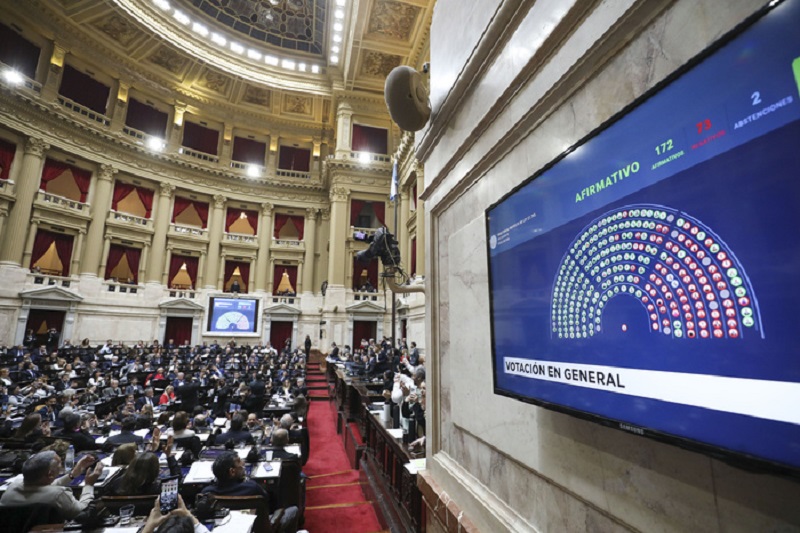
The Chamber of Deputies convened for this Wednesday A special key session, with an explosive agenda for the Casa Rosada since it can advise two new blows to a government that already travels a fulminating crisis. On the one hand, the reform would be discussed so that the decrees of presidential necessity and urgency must have the approval of the Congress to enter into force, and on the other hand the removal of José Luis Espert would be discussed as president of the Budget Commission due to the ties of the deputy with the drug trafficker Fred Machado.
First, the reform of the law that regulates the decrees of necessity and urgency (DNU) will be discusseda tool that has been using Javier Milei arbitrarily and unconstitutional to govern, since the current regulation that comes from the government of Cristina Fernández de Kirchner, allows the Executive to change laws without going through Congress.
The proposed modification, which already has a half sanction of the Senate, It eliminates the so -called “fictional sanction”, which allows a DNU to have validity and validity automatically, unless Congress treats and rejects it through both cameras. If the reform is approved, each decree must be voted within 90 days to be in forceand if a single camera rejects it, it will be enough for it to lose its validity. ANDSto implies a direct limit to presidential discretion, which threatens to cut one of Milei’s favorite tools, but also used all previous governments in their favor.
The DNU, although they are embodied in the Constitution, such as presidential vetoes, Son anti -democratic mechanisms that give a concentrated power to whom the Executive Power occupies. In this regard, Christian Castillo, National Deputy of the Left Frontexplained in a recent interview: “The current law that regulates the DNU, which comes from the Government of Cristina Fernández de Kirchner and that all the governments without modifying applied, makes it easier to approve a decree than approve a law. It is a barbarity because it has abused this, such as the 70/2023 DNU, which is used although it did not apply the ‘need’ or ‘urgency’, and it should not have existed. We are critical that there is the figure of the DNU, and the Argentine presidential system that gives veto power to the president, are completely anti -democratic mechanisms. ”
For La Libertad, it advances, which made use of the DNU and the vetoes from the first day in a quasi -monarchical way, the current scenario is critical: It comes from suffering hard defeats in Congress, where presidential vetoes to emergency laws in disability, pediatric and university budget were rejected, thanks to the enormous mobilization in the streets. These transpiés revealed the political fragility of the ruling party, unable to guarantee majorities to boost or stop projects, and even to defend their own vetoes. If Milei had to condition the DNU to the approval of the Congress, the government crisis and the political regime would undoubtedly deepen even more.
In addition, in the midst of the financial and economic crisiswith the United States conditioning an eventual rescue in dollars to the government show political volume – both in the nearby elections as in their alliances to advance with new reforms -, The approval of this reform to DNU’s law would be a forceful sign of the political decline of the libertarian government, which can directly impact economic stability immediately.
But the agenda is not exhausted there. The opposition benches also promote the removal of José Luis Espert from the Budget Commission, after their links with the businessman Narco Fred Machado were evidenced. The initiative has the support of diverse sectors: Kirchnerism, Federal Encounter, Democracy Forever, the Civic Coalition, Development and Coherence and the Left Front. If they achieve the quorum, the maximum commitment will be to vote their displacement in the same session, although they will need to gather two thirds since the project has no prior opinion.
The deputy Castillo last Wednesday intervened in the commission proposing his removal, remembering that the Left Front block as a whole had already requested his removal in 2024 for the irregularity of his choice at the front, and persistent harassment encouraging the “jail or bullet” to the deputies who defended the right to demonstration.
The concern in Balcarce 50 is evident. The president of the Chamber, Martín Menem, together with first -line ministers and operators, redoubled the pressures on governors and legislators of the so -called “dialogue opposition” to block the session. In the ruling they know that a defeat in this field would deepen the political crisis and leave the government exposed to one of its weakest points: the abuse of decrees to govern without consensus.
After these projects, the agenda also foresees Interpellations sensitive that continue to hit the government’s floating line: to the General Secretary of the Presidency, Karina Milei, and to the Minister of Health, Mario Lugones, for the complaints of irregular payments in the National Disability Agency (Andis), revealed in audios of former headline Diego Spagnuolo.
In a scenario where the economic adjustment is combined with the leakage of dollars, the debt crisis and a string of political defeats, this Wednesday’s session can mark a new break. The reform of the DNU and the possible drop in the Budget Commission would be direct blows to the authority of the Executive. A clear symptom of Milei’s growing weakness, which does not even manage to contain rebellion within Congress itself.
Source: www.laizquierdadiario.com

